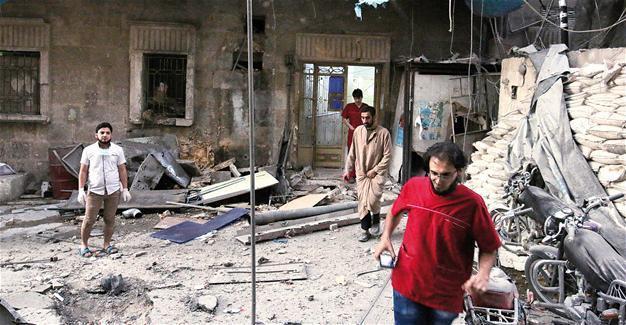Warplanes knock out Aleppo hospital as Russian-backed assault intensifies
BEIRUT

REU Photo
Russian or Syrian warplanes knocked a major Aleppo hospital out of service on Sept. 28, hospital workers said, and ground forces intensified an assault on the city’s besieged rebel sector, in a battle that has become a potentially decisive turning point in the civil war.Shelling damaged at least another hospital and a bakery, killing six residents queuing up for bread under a siege that has trapped 250,000 people with food running out.
The World Health Organization (WHO) said it had reports that both hospitals were now out of service.
The week-old assault has already killed hundreds of people, with bunker-busting bombs bringing down buildings on residents huddled inside. Only about 30 doctors are believed to be left inside the besieged zone, coping with hundreds of wounded a day.
“The warplane flew over us and directly started dropping its missiles ... at around 4 a.m.,” Mohammad Abu Rajab, a radiologist at the M10 hospital, the largest trauma hospital in the city’s rebel-held sector, told Reuters.
“Rubble fell in on the patients in the intensive care unit.”
Medical workers at the M10 hospital said its oxygen and power generators were destroyed and patients were transferred to another hospital in the area. There were no initial reports of casualties in the hospital.
Photographs sent to Reuters by a hospital worker at the facility showed damaged storage tanks, a rubble strewn area, and the collapsed roof of what he said was a power facility.
Another hospital, M2, was damaged by bombardment in the al-Maadi district, where at least six people were killed while queuing for bread at a nearby bakery, according to the Syrian Observatory for Human Rights monitoring body and residents.
Food supplies are scarce in the besieged area, and those trapped inside often queue up before dawn for food.
FBI chief expresses concern about fanatics from Syria, Iraq
FBI Director James Comey told the U.S. Congress on Sept. 27 that law enforcement and intelligence agencies remain extremely concerned that violent militants will eventually flow out of Syria and Iraq and into other countries in hopes of committing attacks.
The number of Americans traveling to Syria to fight alongside the Islamic State of Iraq and the Levant (ISIL) has slowed to a trickle in the last year, but as the so-called caliphate becomes “crushed,” many militants from Western nations who are already there will stream out of the region and create new security threats.
“There will be a terrorist diaspora sometime in the next two to five years like we’ve never seen before,” Comey said in testimony before the Senate Homeland Security and Government Affairs Committee.
Comey was testifying alongside Homeland Security Secretary Jeh Johnson and Nicholas Rasmussen, director of the National Counterterrorism Center, at a hearing examining threats to national security 15 years after the 9/11 attacks.
The hearing took place just over a week after bombings in New York and New Jersey and a separate stabbing attack at a Minnesota mall.
Rasmussen said that in addition to ISIL, U.S. government officials are concerned about the capabilities and ambitions of al-Qaida and its affiliates.
Johnson said terrorist threats have evolved, moving from terrorist-directed attacks “to a world that also includes the threat of terrorist-inspired attacks” in which individuals who live in the U.S. are “self-radicalized” to attack their own country.
Johnson says that by their nature, terrorist-inspired attacks and terrorist-enabled attacks are difficult to detect by intelligence and law enforcement communities, can occur with little or no notice and in general make for a more complex homeland security challenge.
















